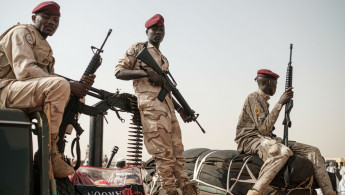Sudan triggers state of emergency in east over tribal clashes
Sudan activated a state of emergency in an eastern state on Sunday and ordered a probe into deadly tribal violence that has rocked the region for days, authorities said.
Clashes have raged since Wednesday between the tribes of Bani Amer and Nuba in Port Sudan, the capital of the Red Sea state.
Sudanese police said that at least 16 people had been killed and forces had been dispatched to contain the fighting.
It was not clear what triggered the clashes.
"The sovereign council decided to relieve the governor of the Red Sea and the head of its security apparatus (from their duties)," the country's transitional ruling body said in a statement.
It also "ordered the activation of a state of emergency (in the Red Sea state) and the formation of an investigating committee".
It said authorities had "detected for the first time the use of firearms in the fighting, which reveals the presence of internal and external interferences to fuel the conflict".
Tribal clashes are often reported in several regions of Sudan, especially in the war-torn western region of Darfur.
Ethnically-diverse Sudan was rocked by months of nationwide protests that ousted longtime leader Omar al-Bashir in April and which this month ushered in the beginnings of a transition to civilian rule.
The country is currently led by a civilian-majority body which is to oversee a three-year transitional period and pave the way for elections.
Meanwhile, heavy rainfall and flash floods have killed 62 people in Sudan and left 98 others injured, the official SUNA news agency reported on Sunday.
Sudan has been hit by torrential rains since the start of July, affecting nearly 200,000 people in at least 15 states across the country including the capital Khartoum.
The worst affected area is the White Nile state in the south.
Flooding of the Nile river remains "the biggest problem", SUNA said, citing a health ministry official.
On Friday the UN said 54 people had died due to the heavy rains.
It said more than 37,000 homes had been destroyed or damaged, quoting figures from the government body it partners with in the crisis response.
"Humanitarians are concerned by the high likelihood of more flash floods," the UN said, adding that the rainy season was expected to last until October.
The floods are having a lasting humanitarian impact on communities, with cut roads, damaged water points, lost livestock and the spread of water-borne diseases by insects.
The UN Office for the Coordination of Humanitarian Affairs said an extra $150 million were needed from donors to respond to surging waters, in addition to the $1.1 billion required for the overall humanitarian situation in Sudan.
Follow us on Twitter: @The_NewArab





 Follow the Middle East's top stories in English at The New Arab on Google News
Follow the Middle East's top stories in English at The New Arab on Google News
![The UAE is widely suspected of arming the RSF militia [Getty]](/sites/default/files/styles/image_330x185/public/2024-11/GettyImages-472529908.jpg?h=69f2b9d0&itok=Yauw3YTG)
![Netanyahu furiously denounced the ICC [Getty]](/sites/default/files/styles/image_330x185/public/2024-11/GettyImages-2169352575.jpg?h=199d8c1f&itok=-vRiruf5)
![Both Hamas and the Palestinian Authority welcomed the ICC arrest warrants [Getty]](/sites/default/files/styles/image_330x185/public/2024-11/GettyImages-2178351173.jpg?h=199d8c1f&itok=TV858iVg)